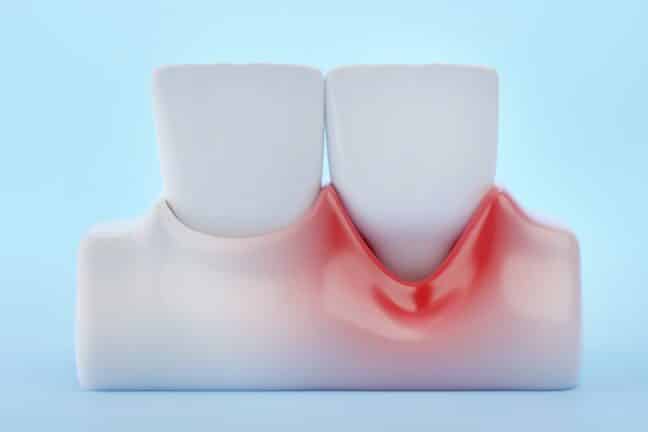Gum recession, a type of gum disease, exposes the roots of the teeth, making them susceptible to cavities and infection. It also leads to tooth sensitivity when eating, drinking, and brushing, which can significantly impact your daily life.
Many contributing factors to gum recession include periodontal disease, braces, lip and tongue piercings, orthodontics, and chewing tobacco. However, recession is commonly seen as people age. Most people over 65 have gum recession on at least one tooth. Left untreated, gum recession can eventually lead to tooth loss.
The following tips can help you avoid gum recession so you can preserve your teeth and avoid sensitivity and other problems linked to receding gums:
1. Brush and Floss Properly
Good oral hygiene is your best defense against gum recession. Flossing every day and brushing twice daily significantly reduces the chance of periodontal disease, cavities, and receding gums. Antibacterial mouthwash also provides an extra layer of protection.
Be sure to use a soft-bristle toothbrush and avoid brushing too hard. While you may think brushing aggressively will get your teeth cleaner, it can damage delicate gum tissue and wear down tooth enamel, leading to gum recession. Brush twice daily but do so gently.
2. Quit Using Tobacco
Smoking and chewing tobacco are dangerous to your health in many ways. Receding gums are just one of the serious consequences of smoking or chewing tobacco. Using any form of tobacco leads to excessive plaque and tartar buildup, which encourages gum recession.
3. See Your Dentist Regularly
Schedule a dental checkup and professional cleaning at least twice yearly. At these appointments, a dental hygienist will remove plaque and tartar that can’t be removed by brushing. Your dentist will also check for the early signs of gum recession and determine whether any intervention is needed.
4. Wear a Night Mouthguard If Needed
If you’re one of the millions who grind or clench their teeth at night, a custom mouthguard could relieve and protect your teeth and gums. Designed to fit your mouth comfortably, it can eliminate the clenching or grinding that wears away at your teeth and causes your gums to recede.
5. Remove Lip and Tongue Piercings
Lip and tongue piercings can damage your teeth and irritate your gums. The jewelry rubs along the gums, aggravating delicate tissue and wearing it away. Over time, the gums may recede, and you may crack one or more teeth.
6. Avoid Sugary Food & Drink
If you notice mild gum recession, it’s time to review your diet. Bacteria thrive in an acidic environment and will flourish and encourage gum recession if you eat and drink a lot of sugary treats. Avoid sugars and starches, especially later in the day, and always rinse or brush after to minimize the exposure of your teeth and gums to the acids derived from the sugars.
Early Treatment is Best
Early signs of gum recession should never be ignored. Receding gums can’t be cured, but the process can be stopped with proper treatment and care. If gum recession is severe, surgery may be needed to cover the tooth roots, although this is only done when the damage is advanced and there is a risk of tooth loss. Early intervention can prevent lasting damage if you suspect your gums are receding. Contact your nearest Leading Edge office to schedule an appointment.

